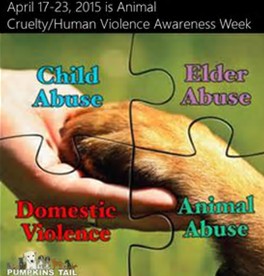
April. April 18-24, 2004 is also Animal Cruelty/Human Violence Awareness Week. Veterinarians, animal shelters, rescue organizations, animal protection agencies, pet owners, and many other concerned citizens join with them in increasing the public’s awareness of the animal cruelty problem and its link to domestic violence.
The ASPCA has launched “Fight Animal Cruelty,” a web component that will be accessible via www.aspca.org. The website includes a comprehensive anti-cruelty database allowing users to learn about humane laws and designated penalties in their state, and a humane directory to locate local humane law enforcement agencies. The site section will also include a broadcast public service announcement featuring ASPCA Humane Law Enforcement agent Joe Pentangelo that will launch on the Animal Planet network in April, as well as anti-cruelty prevention tips and links to articles, success stories and on-line advocacy campaigns.
Animal cruelty laws vary from state to state and the agencies responsible for investigating cases may vary from county to county. Cruelty can range from basic neglect (failure to provide food, water, shelter, or necessary medical care) to intentional abuse, torture, or death. Violence against animals may also be part of a pattern of violence against people.
To make life more humane for the animals sharing our environment, ASPCA offers the following advice:
- If you witness or hear about an act of animal cruelty taking place, report it to your local humane organization, veterinarian, or call your local police. Humane law enforcement agencies may be located in the Yellow Pages of a local telephone book under ‘Humane Societies’ or’ Animal Shelters,’ and can also be found on a searchable database at www.aspca.org/site/FrameSet?style=Animal.
- The ASPCA’s Legal Department provides information and answers to many questions on http://www.aspca.org/site/PageServer?pagename=legal_faq. Local law enforcement agencies and prosecutors that are investigating and prosecuting animal cruelty cases can obtain advice from legal@aspca.org about pending cases.
- Learn about animal-friendly legislation pending in your state from the ASPCA’s Government Affairs and Public Policy department. You can actively help in passing laws by writing letters of support to your lawmakers. The advocacy center at http://www.aspca.org/site/PageServer?pagename=lobby allows you to automatically send personal letters to state or federal officials.
- If you own a pet, be responsible and provide it with annual veterinary check-ups and preventive medical care; spay or neuter your cat, dog, ferret, rabbit, or other pet to reduce pet overpopulation, and encourage friends to do the same.
- Teaching future generations to respect animal life will make our society more humane. Make sure nearby schools include humane education as part of their curriculum or lesson plan. Contact education@aspca.org.
- Support your local animal rescue organization or shelter with donations of money, food, or supplies. Volunteering your time or fostering a shelter animal is a good way to make a difference. Fostering helps socialize abused or frightened animals before they are adopted.

Leave a Reply